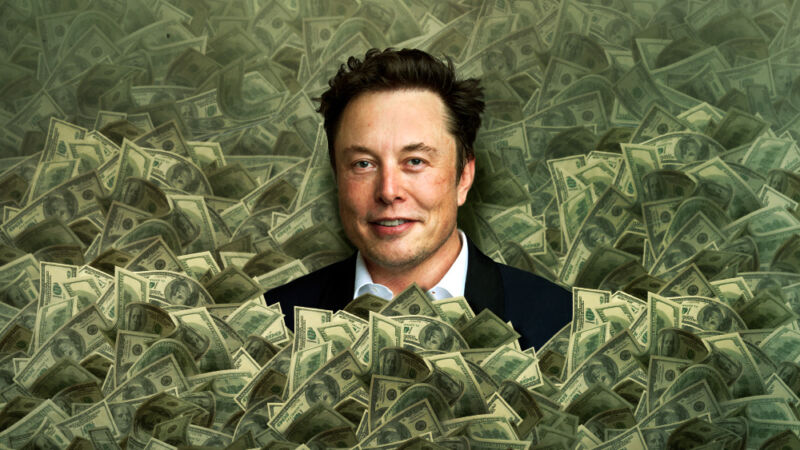
Elon Musk, Larry Ellison, and other current and former Tesla board members agreed to return over $735 million to settle a shareholder lawsuit that alleged Tesla directors "grossly" overpaid themselves. The Tesla directors, who also include Musk's brother Kimbal Musk, further agreed to forego stock options and other compensation for board service in 2021, 2022, and 2023.
"Musk has installed his family and friends on the Company's Board and through them he dominates and exercises control over Tesla and is able to avoid independent oversight of the way he runs the Company," the 2020 lawsuit alleged. "In return, with Musk's blessing and vote as a director, the Director Defendants have consistently paid themselves unfair and lavish compensation" that "grossly exceeds norms for corporate board compensation."
The settlement filed Friday in Delaware Court of Chancery provides for $458,649,785 in returned options and $276,616,720 in "returned cash and/or returned stock." The money will be returned to Tesla.
The settlement, which is pending court approval, also requires future director compensation packages to be voted on by shareholders. The settlement terms would be in force for five years after they take effect.
The Police and Fire Retirement System of the City of Detroit, a Tesla shareholder, filed the suit as a derivative complaint on behalf of Tesla. The contested stock options were worth $437 million when the complaint was filed in June 2020, but Tesla's stock price has more than quadrupled since then.
Tesla board still denies wrongdoing
The defendants "deny any and all allegations of wrongdoing, fault, liability, or damage whatsoever," the settlement agreement says.
"The settlement is one of the largest ever for a derivative case in the Court of Chancery, a major venue for shareholder litigation," according to Reuters. "Tesla had argued it used the stock options to ensure the incentives of directors were aligned with the goals of investors," Reuters also wrote.
The lawsuit alleged that Tesla board members "consistently awarded themselves unfair and excessive compensation every year from 2017 through 2020. Their disloyal, self-interested compensation determinations have deprived the Company of tens—if not hundreds—of millions of dollars. The Director Defendants' lavish compensation came in several forms, including not just cash retainers but also option awards which have generated, and will continue to generate, massive windfalls."
Besides the Musk brothers and Ellison, defendants include board Chair Robyn Denholm; board members Ira Ehrenpreis, James Murdoch, and Kathleen Wilson-Thompson; and former board members Brad Buss, Antonio Gracias, Stephen Jurvetson, Linda Johnson Rice, and Hiromichi Mizuno. Ellison, the co-founder and CTO of Oracle, left Tesla's board last year.
The lawsuit said that Gracias, Jurvetson, Ehrenpreis, and Ellison are Tesla investors and personal friends of Musk.
With the lawsuit pending, the Tesla board voted in 2021 and 2022 to forego any automatic grants of annual stock option awards until July 2023. Under the settlement, the directors "shall forego permanently the 2021 and 2022 Foregone Options... and shall not hereafter receive any compensation for Tesla Board service for 2021 or 2022. The Current Director Defendants shall also forego permanently any compensation for Tesla Board service for 2023."
Lawsuit: Musk had outsize control over pay
The lawsuit said that changes to director compensation in 2014 and 2019 failed to gain majority support from shareholders who aren't affiliated with Tesla. But in both cases, "Musk cast his shares to force the measure through even though he was not independent of the beneficiary Director Defendants; i.e., his friends and family." The 2019 plan "does not have even a theoretical limit on the number of shares that Tesla's nonemployee directors can grant themselves," the lawsuit said.
"Demonstrably unmoored from independent stockholder checks on their self-compensation, they have granted themselves millions in excessive compensation and are poised to continue this unrelenting avarice into the indefinite future," the shareholder lawsuit alleged.
Under the settlement, Tesla in future years will have to "submit the proposed annual compensation to be paid to Non-Employee Directors to an approval vote of the majority of Unaffiliated Tesla Stockholders." The defendants and other Tesla directors must "abstain from voting in their capacity as stockholders on the votes required by this Section and shall not be counted as shares present or entitled to vote for purposes of determining the majority," the settlement said.
Tesla will have to hire an "independent compensation consultant" to advise on proper compensation each year and then provide shareholders with information about how director pay proposals were determined before the annual votes.
As Reuters pointed out, the "settlement does not impact the $56 billion compensation package of Elon Musk, which is being challenged by shareholders in a separate lawsuit that went to trial last year. A ruling is expected soon in the Musk case."
reader comments
397